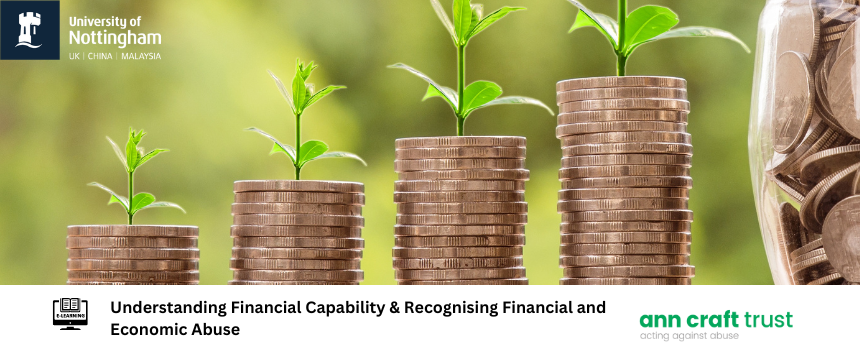
Helping people control their finances while recognising the risks of financial abuse.
The Ann Craft Trust has launched a new eLearning course focused on financial abuse and financial capability.
The course includes information, interactive tasks, videos, and quizzes to help the learner understand more about financial capability, along with the risks of financial abuse and exploitation. It also provides some guidance on how we can safeguard ourselves against these risks.
The course covers:
- Financial capability and numeracy skills
- Financial, economic and material abuse
- Grooming and exploitation
- Tips to protect yourself
- Further resources and places for support
The first 1,000 places of this course are free! Learn more.
Module 1 – Recognising Financial and Economic Abuse
This module describes financial and economic abuse based on the relevant legislation. It also draws from subject matter experts, videos, and case studies to help individuals recognise this abuse.
Module 2 – Understanding Financial Capability
This module describes the steps one can take to increase financial capability. It includes tips to help participants work towards financial capability while protecting themselves from financial abuse.
Conclusion – How We Can Improve Our Financial Capability
This section provides a summary of the course content, with some additional comments from subject matter experts. It also includes a list of useful resources and helpful contacts, for anyone who needs any support or additional information.
Find Out More and Book Your Place
About The Course
This course is based on research carried out by Nora Wikoff, Assistant Professor in Quantitative Methods, School of Sociology and Social Policy, University of Nottingham.
The research focused on the role of numeracy in helping families manage problem debt and mitigate its effects on financial and emotional wellbeing.
Years of low interest rates and weak wage growth have fuelled a steady increase in unsecured borrowing. Taking on debt can allow individuals and families invest in the future. Yet reliance on credit to maintain a lifestyle can impact a families’ long-term financial wellbeing.
Numeracy reflects the extent to which individuals have the skills and confidence necessary “to use numbers and data to make good decisions in daily life”. Innumeracy is a pervasive social challenge, exacerbating low productivity levels and perpetuating low financial capability in the population.
Innumeracy renders families vulnerable to over-borrowing and under-saving, as people often underestimate the total costs of debt. When bills mount, a lack of confidence around numbers and finances limits families’ abilities to reduce expenses and pay off their debts in an affordable manner.
Over-indebted families risk entering into debt spirals, as repayments necessitate further borrowing. Innumeracy and over-indebtedness are each closely tied to poor mental health and other negative outcomes. Despite these links, financial literacy and debt counselling interventions rarely consider numeracy when devising strategies to help families eliminate problem debt.
The intention is that this eLearning will help people work towards improved financial wellbeing through boosting their financial capability, and their awareness of abuse and exploitation.
